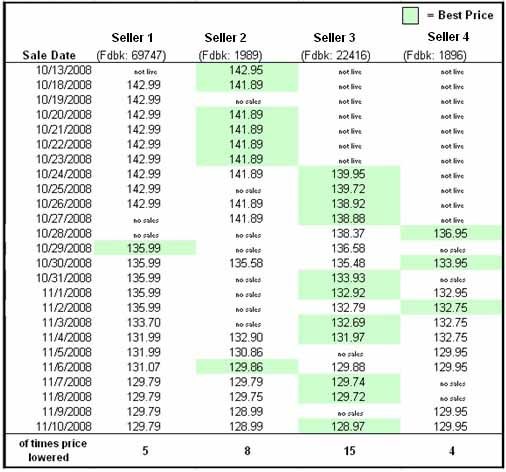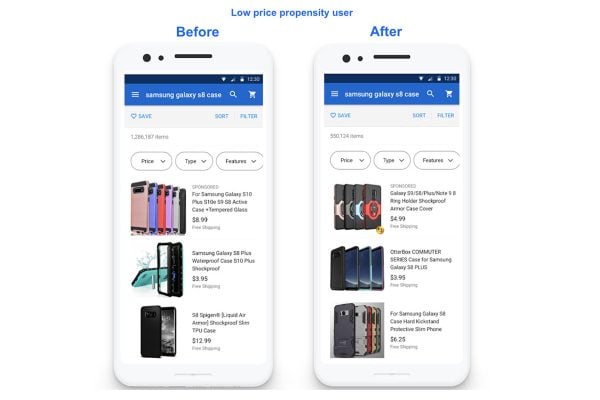
In order to carry on attracting sales the sellers were forced to compete with price drops at times of less than a dollar. As soon as a competitor entered the market, with a new listing at a lower price, existing sellers were forced to trim their margins or sales dried up. The end result is a product which started selling at $142.95 in less than a month dropped 10% and is now sold at £128.97.
Competitive pricing is nothing new to eBay or the Internet as a whole. Apart from convenience one of the major benefits of shopping on line is price comparison and being able to find the best product and service at the lowest cost, it’s no surprise that sellers have to be ultra competitive on eBay.
What is interesting is the difference between eBay.com and eBay UK. On eBay.com price appears to be one of the most sensitive factors in Best Match, that’s not the case on eBay UK. In the UK Recent Sales are so important that it’s difficult to dislodge and incumbent from the top of Best Match, even if you offer a price that’s significantly lower. Undercutting by a few pennies in the UK appears to make little difference in search standing making it much harder for new sellers to gain visibility, especially for products with a high sales velocity.
On the UK site sellers that listed multiple item fixed price items first and gained recent sales have built what at times looks like an unassailable position at the top of Best Match. The more sales they attract the higher they appear in search and, in a never ending circle, the higher they appear in search the more sales they attract.
Buyers seeing a product at a reasonable price at the top of search results appear to be acting as eBay expected and buying the “Best Matched” product. New listings, even if offered at a lower cost, are finding it harder and harder to compete. This is especially true on low cost commodity products where margins are often measured in pennies rather than pounds. Quite often the Best Matched product is no where near the Best Priced, it’s simply the listing with the most purchases.
Recent Sales can be counted as far back as 60 days on back to back 30 day listings. Once a seller has a long history of sales on a product even outselling them 3 or 4 to 1 isn’t enough to discount their previous sales and dislodge their search standing. Although the most Recent Sales are weighted as more significant a seller with hundreds or thousands of previous transactions on a single listing appears to have an unassailable position at the top of Best Match.
Prices are being driven down and sellers margins squeezed as they fight for visibility but on eBay UK, for sellers that do gain the top spot in Best Match, it appears they can hold their position without being being overly pressured to reduce prices. The chances are they’ll keep the top spot in search results until they run out of stock.
Which site is best for sellers? In the US price appears to be key and if you’re not the cheapest and managing your prices to ensure you stay competitive sales dry up. If you’re in the UK and you’re not at the top of Best Match with a long history of sales from your listing it’s almost impossible to compete against an incumbent.
One thing is for sure, margins are finite, sellers can’t afford to supply at a loss and prices can only drop so far. Those with the biggest inventory will win in the long term and running out of stock on a top selling line is the worst possible situation to be in. Once you lose your position in search and your next delivery arrives it may be nigh on impossible to regain your former search standing and resultant sales.









22 Responses
As we showed in our webinar, eBay had a graph showing how successful sellers were based on how their prices compared to the average price for that item on eBay.
As you might imagine, people who had higher prices had some sales, but not a lot.
The graph SPIKES at 10-25% lower than the average price. Of course, if everybody starts pricing lower, the average falls. But we know from behaviour on eBay that shoppers tend to treat the average price like it’s the VALUE of the item. If you price higher, they will think you’re out of your mind.
The interesting thing on the graph was that if your price is less than 25% below the average, your sales drop again to similar levels as items priced above the average. My guess would be that at that point, people may just not believe it’s real or in good condition, etc…
So while I think eBay has always been a place to bargain hunt, and the graphs show people go for the lower prices, I thought it was interesting that eBay showed poorer sales results for people who REALLY dropped prices.
Thanks Debbie…. I’ll put my prices back up! 😀
One trick a lot of people seem to be missing is using MarkDown Manager to temporarily deflate prices. It enables you to be cheapest on eBay with a higher headline rate. The lower price is temporary, and at the end of the sale returns to your full price with NO loss of visibility in Best Match.
Definitely one that should be experimented with if you want to cut prices with the option of restoring them to previous levels 😀
That’s an interesting comment Chris. I know you lose Recent Sales factor if you raise your price through revision. Makes you wonder if Markdown Manager will wipe out any benefit after the markdown is over (e.g. revision to higher price).
You pay a premium to be #1 but is it really necessary? As long as you are say top 3, I would argue, you receive equal visibility as rank 1. You don’t have to be the cheapest, but you should be up there in terms of rank for a specific keyword search.
If you want to be #1, you would need to exceed the daily volume that the current “king of the hill” holds and it would take as long as number of days Recent Sales calculation is used for that category. For art, it might be 30 days, while iPod may only be 3 days.
Recent Sales solidifies in my mind that eBay sellers need to branch out. I have a few inbound links where forum members recommend a product I sell. I have to list the same product for less on eBay to compete, but I can sell many on our web store for a higher price. Direct referrals are valuable since it removes the direct competition issue that eBay searches raise.
I would rather have the most PROFIT, than the most sales
What Norf said, eBay don’t seem to have much of a clue about selling,profit and loss….I could shift a million baths a year if I kept dropping the bloody price but to actually continue to do it on a long term basis I would have to be making a profit not a loss,,
Well said Norf
I am not sure price is always the most important, I will certainly buy not on that fact alone service plays a big part, I tried that shiply website and got offered a great price but the service has been awful from the company they have let me down twice now!
Also one line I have been selling is titanium rings, now I sell the same rings as a competitor does, his rings are £39.99 – £49.99 plus £2.95 delivery. I sell mine at £19.99 including delivery yet he has been selling more than me!!!!! So put my prices up and now selling more…………………lol
I think it must of been that people thought they were to cheap so not as good…..
Anyway thats my little thought
Stu
I think adjusting the prices are a great idea. It all about the profit that what I learn at newhouseinfoproducts.com.
Don’t forget that if your prices are too low you will also attract a different kind of buyer.
I noticed almost all Quantity Manager users are from the UK. In the US people just seem to complain about best match.
I think ebay’s continued fall in share price accurately relflects its policies.
It is a struggle to sell items profitably with ebay/paypal charges & policies and this is coming home to roost. I think sellers will continue up until the Xmas period and then a load will drop out, coupled with buyer’s credit card bills in January, will see a huge drop in sales/revenue/fees.
I wouldn’t be suprised in a $5 share price in the new year.
#3 Markdown Manager doesn’t lose recent sales score when a sale ends and it reverts to the original price 😀
On the being no1 or no3 in search results it makes a huge difference for commodity products. At the end of the day if no1 and no3 are selling the same product at the same price no1 will outsell them many times over. Buyers appear to think the no1 position is best (Why wouldn’t they?). Even if no3 is cheaper on many commodity items at sub £5 cheaper will be measured in pennies and that doesn’t appear to be enough to attract the majority of buyers from no1 to no3 (or even no2)
Of course it’s different in categories like art where products will be substantially different and subjective.
Today I noticed that my sales were drastically up so I did a quick search and it appears I finally recaptured my niche. The price of my item is, as far as I can tell, the average selling price. There are several sellers that sell above and below what I’m charging. Now I just wish I was using markdown manager because there is no way to raise my prices without losing all my hard work.
Speed of delivery is as important as price. Some of my items are at full RRP (with postage included), but I hold them in stock, and the customer can have them the following day. My wife recently wanted UGG boots, and was willing to pay over the RRP, because she did not want to go around the shop looking for them…the hassle of parking…etc.
Offer good service, at a fair price and that’s better than cheap prices. What I do find is cheap prices usually also entail poor images from sellers, poor DSR’s etc.
at the end of the day if you are continually selling items at a very poor margin (even a loss as many seem to) where is the motivation to actually provide a good service,
we really cannot believe why many sellers actually bother considering the returns they make per item
As a shopper, I shop by price for commodity items. For collectibles, its quality and finding. I am actually finding it harder and harder to find commodity items on eBay. While they try bulk items together such as “Gilmore Girls, Season 1″ (ala’ express, ala’ half.com, ala” amazon). I’m not sure they are any close to providing a great finding experience.
crystal
I was thinking this morning about dropping the price of an item as I saw a competitor had dropped his, but, and heres the but..my item has had sales and is advantaged in search, so if I lower my price will my listing have a disadvantage in search?
No, Whirly – it’s only if you raise the price that you will be disadvantaged.
However, if you’re still getting sales at the higher price, why not leave it?
17 Thanks Gill. I find trawling through the eBay announcements a real ball ache 🙂
The only reason I considered a drop was a competitor selling an identical product had lowered the sale price, I *think* I was winning the battle because of better feedback but with the ole credit crunch I think price can play more of a roll? so I am watching the other players more carefully.
14~###
hits the spot precisely
if your not making money, your service is not going to be that good, unless your crackers,
even then, it dont matter if your a saint, you cant control the poor sevice of others, ebay buyers dont think of the individual seller, they think of ebay in general
#18 Role, not Roll as in cheese. Dam cat walked over my keyboard. Honest.
quick grab that cat, I need to speak with it,
it must be the same bugger ,thats bid on my items and not paid
#21 LOL, it’s amazing how clever those damn cats are, they are forever buying things on ebay, I’m surprised mine haven’t tried to sell the dog on ebay!